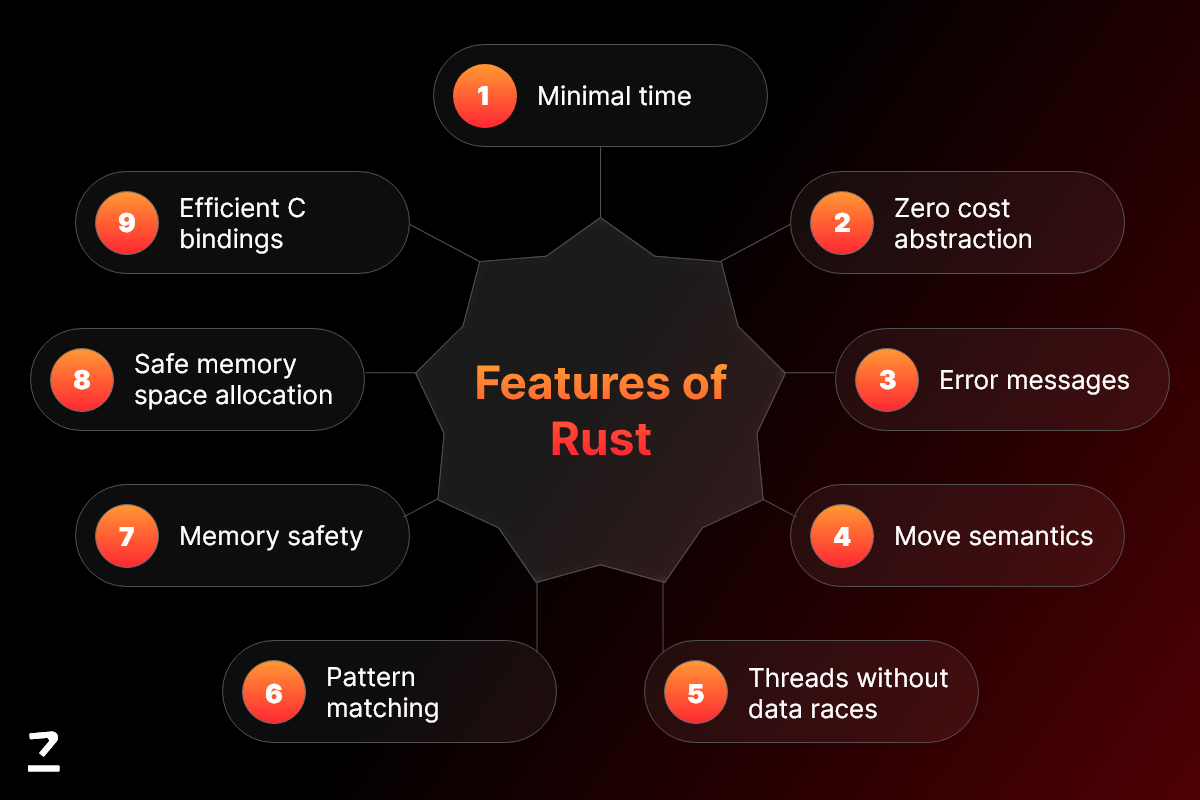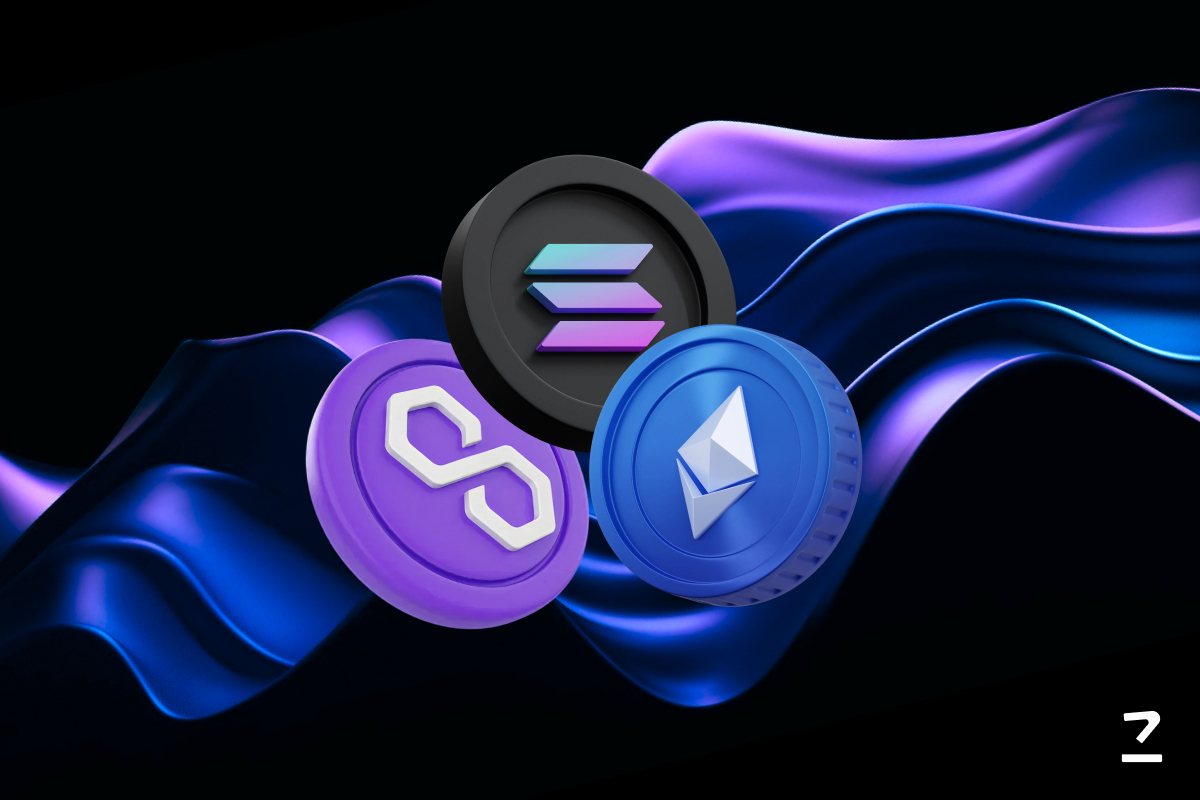SHARE THIS ARTICLE
Decoding Rust: Everything You Need to Know About the Programming Language

As the current digital landscape continues to evolve at a blistering pace, the need for robust and efficient programming languages is evident and apparent. Out of several languages that have been developed in recent years, Rust has gained significant attention. Designed by Graydon Hoare and sponsored by Mozilla, version 1.0 of the language was released in 2015. Its popularity has been consistently increasing ever since; in fact, a survey of developers on Stack Overflow in 2019 voted it as “the most loved language”. One of the reasons for its popularity is the similarity of its syntax to that of C++. However, experts are still skeptical if it will replace it in the near future.
Having said that, the use of Rust among developers is growing consistently. This is because it has emerged as a powerful tool for software development across various domains, prominently including blockchain development and mobile app development, among others.
Understanding Rust Programming Language
Rust is a modern, statically-typed systems programming language with safety, concurrency, and speed at its core. Unique features such as zero-cost abstractions, fearless concurrency, and memory safety guarantees make it an ideal choice for developing robust and secure software solutions.
Memory safety guarantees, in particular, ensure that programs are free from common bugs like null pointer dereferences, butter overflows, and data races, prevalent in languages like C and C++. It catches these bugs at compile-time, preventing them from occurring in production. This way it leads to more reliable and secure software. Furthermore, with a very strict compiler, it guarantees an efficient usage of memory and assists in identifying errors.
Key Features of Rust

Memory Safety
Enforcing memory safety at compile-time is one of Rust’s standout features. It ensures that memory is managed correctly by using its ownership system to track the ownership and lifetime of variables. It employs a borrowing mechanism, comprising a borrow checker which analyzes the code to prevent invalid memory access and data races.
To further explicate it, Rust handles object-based memory allocation directly and as a result, no program can access ringed-off resources or continues to consume memory after the completion of a procedure. This prevents a user from inputting more information than the storage capacity of a program’s pre-defined memory space.
Concurrency
Rust allows developers (Rustaceans) to write concurrent code with ease through the concept of fearless concurrency. It ensures thread safety by providing abstractions like threads, channels, and message passing, along with strict compile-time checks. With such an efficient approach to concurrency, Rust enables developers to harness the power of parallelism, all the while ensuring safety and fewer concurrency-related bugs.
Performance
Rust is specifically designed to match or even surpass the performance levels of other low-level languages like C and C++. It utilizes zero-cost abstractions to achieve this, where high-level constructs do not lead to any runtime overhead. Rust provides control over low-level details without sacrificing productivity, allowing developers to write safe as well as fast code. This makes Rust the perfect fit for applications such as systems programming and high-performing computing, which require optimal performance.
Expressive Type System
Developers can utilize Rust to write concise as well as readable code owing to its expressive and flexible type system. It makes the development process more efficient and reduces boilerplate code as the type mechanism eliminates the need for explicit type annotation in most cases. Rust’s type system catches errors at compile-time and prevents numerous runtime crashes, ensuring a well-typed code.
Other Prominent Benefits of Rust
The Rust Compiler
The Rust compiler is arguably the most integral aspect of the Rust programming language. It’s incredibly strict, significantly limiting the potential for errors and bugs. It helps developers identify and fix issues with clear error messages. Essentially, unless the Rustaceans explicitly choose to do so, it’s nearly impossible to write unsafe code in Rust.
Cross-Platform Compatibility
As a cross-platform language, Rust allows developers to compile and execute their written code on different operating systems and architectures. Owing to this flexibility, they can target multiple platforms, retaining most of the codebase. Rust ensures a consistent and reliable development experience across different environments, regardless of developing for desktop, mobile, or embedded systems.
Growing Ecosystem & Community
With a wide range of libraries, frameworks, and tools, Rust boasts a vibrant and rapidly growing ecosystem. The community is quite active and inclusive, consistently contributing to the development and improvement of the language and providing support to fellow developers. Furthermore, the Rust community is known for its helpfulness and commitment to maintaining high code quality. Such community support, along with the availability of a diverse range of libraries fosters collaboration among developers and leads to increased productivity.
An Excellent Option for Building Distributed Systems
The low-level systems programming capabilities of Rust allow developers to interact with networking protocols and handle complex distributed tasks, making it an excellent choice for building distributed systems. Rust developers can utilize it to create resilient distributed systems that can gracefully handle failures, owing to its robust error mechanisms. Moreover, since Rust strongly focuses on performance and efficiency, it ensures optimal performance in large-scale data processing and real-time communication.
Better than Java & at Par with C++
Rust delivers comparable performance to C++ and surpasses Java in numerous cases, particularly in terms of memory consumption and execution time. It minimizes runtime overhead while still achieving efficient execution. As a result, the performance of Rust code matches or sometimes even exceeds that of C++ while providing stronger guarantees against memory-related bugs. When compared to Java, Rust’s performance benefits and direct memory control often leads to more efficient and faster code execution.
A Long-Lived Language
Rust is a long-lived language as it ensures that code written in older versions continues to work without major changes, making it a safe bet for long-term projects. Essentially, commitment to stability, backward compatibility, and long-term support are at the core of this characteristic of the Rust Programming Language.
Rust for Blockchain Development
When it comes to Blockchain development, it requires efficient as well as secure programming languages and Rust fits the bill perfectly. The memory safety guarantees of Rust enhance the security and reliability of Blockchain applications by preventing common vulnerabilities. Efficient processing of transactions and consensus algorithms are crucial in Blockchain networks and the concurrency and parallelism features of the Rust programming language ensure it. Its inherent performance optimization also helps in maximizing the throughput of Blockchain systems by providing efficient resource utilization.
Rust also supports smart contract development quite well, thanks to its safety guarantees and rigorous compile-time check. Moreover, Rust offers specialized libraries and tools for Blockchain development. For instance, Parity Substrate empowers developers to build customizable blockchains and Cargo-Contract eases the development and testing of Rust-based smart contracts. The suitability of Rust for Blockchain development is further solidified by its growing adoption in the Blockchain community, seen in projects like Polkadot. Therefore, Rust Blockchain development is indeed the ideal way of developing secure, efficient, and scalable Blockchain applications.
Other Notable Applications of Rust
Alongside Blockchain development, Rust is well-suited for a variety of other domains and use cases owing to its unique features and capabilities. Here are a few areas where Rust shines:
Systems Programming
Rust is an excellent choice for developing low-level systems software, such as operating systems, device drivers, and embedded systems. Its emphasis on safety and performance, coupled with fine-grained control over memory and resource management, and lack of garbage collection leads to the development of efficient and reliable systems software.
Mobile App Development
Capabilities like cross-platform development and integration with existing codebases make Rust a compelling choice for Mobile app development. For instance, developers can leverage Rust to build mobile apps that run seamlessly on both iOS and Android, using frameworks like Flutter and React Native. Furthermore, Rust is interoperable with other programming languages like C and Objective-C, making it a good fit for integrating existing codebases in mobile app development. Developers can seamlessly call Rust code from other languages using Rust’s Foreign Function Interface (FFI). All-in-all, Rust mobile app development is an effective way of developing fast, reliable, cross-platform applications.
Web Development
Rust-based frameworks like Rocket and Actix offer a solid foundation for developing high-performance web applications. With features like asynchronous programming, routing, and middleware support, these frameworks enable the development of scalable and secure web applications.
Networking & IoT
Rust is well-suited to networking and Internet of Things (IoT) applications due to its lightweight runtime and its ability to handle low-level operations. Moreover, Rust’s safety guarantees and performance benefits lead to efficient implementations of network protocols, the development of network services, and the creation of firmware for IoT devices.
Popular Organizations and Projects Using Rust
Various organizations and projects across different industries have adopted Rust. Here are some notable examples:
Mozilla
Mozilla has been one of the major contributors to the development of Rust. They extensively utilize the programming language in some of their prominent projects, including Firefox and the Servo web engine. Mozilla has utilized Rust to write several crucial elements of the Firefox web browser as a part of Project Quantum, especially to optimize the deployment of parallel programs.
Dropbox
Dropbox utilized Rust to develop one of the core parts of its system, called the sync engine, along with their networking stack, and security infrastructure. In the sync engine, it is used to implement its memory management system, helping to prevent memory leaks and other errors. Dropbox developers use Rust to code complex type invariants and depend on the compiler to check them.
Cloudflare
Cloudflare used Rust to build its core edge logic. It enabled them to ensure that the Content Delivery Network (CDN) can handle high traffic loads without slowing down. For instance, Rust is utilized to implement Cloudflare’s routing system, responsible for routing traffic to the most appropriate server.
Facebook uses Rust to enhance the performance and reliability of their Memcached server. They use Memcached as a high-performance in-memory caching system to store frequently accessed data and Rust is used to implement its memory management system.
Moreover, Facebook utilizes Rust in the GraphQL query language, which is used to interact with APIs. Rust is used in the language to implement its parser and executor, which ensures the quick and correct execution of the queries.
Microsoft
Microsoft implements Rust in the Windows Kernel, the core of the Windows Operating System, to implement a number of critical features, with memory management and scheduling being the primary ones.
Furthermore, the tech giant uses Rust in the .Net Core, a cross-platform runtime to implement garbage collection and thread synchronization.
Parity Technologies
As a prominent Blockchain infrastructure provider, Parity Technologies is extensively involved in the development of Rust-based frameworks. For instance, they utilize Rust for projects like Parity Substrate, a highly flexible framework for developing custom blockchains, and the Polkadot network, a multi-chain platform.
It’s Not All Plain Sailing
Rust improves on many aspects of C++, however, these improvements are still not enough to warrant its wholesale adoption over existing languages. This is the reason certain experts believe Rust is far from overtaking C++ as a preferred programming language.
Moreover, Rust isn’t that beginner-friendly, and being a new language, the level of resources it has is not comparable to the alternatives.
Having said that, quite a few technology companies are aggressively hiring Rust developers, primarily to supplement existing programming practices.
Thinking of Implementing Rust in Your Project? We Can Help!
Looking to leverage Rust for your upcoming or existing project? As an expert Rust Development Company, we, at Codezeros, have successfully delivered powerful and efficient Rust-based solutions to numerous clients. Whether looking to build a system from scratch or add to the functionality of an existing one, we are one of your safest bets. Get in touch with us today to discuss your project or learn more about our Rust development services.
Post Author

As a distinguished blockchain expert at Codezeros, Paritosh contributes to the company's growth by leveraging his expertise in the field. His forward-thinking mindset and deep industry knowledge position Codezeros at the forefront of blockchain advancements.
Looking to leverage the potential of Rust for your next blockchain project?
With a team of experienced Rust developers at our disposal, we can help you build robust and efficient decentralized solutions and applications.



